The Cambridge History of Japan, Vol. 4: Early Modern Japan
Подождите немного. Документ загружается.

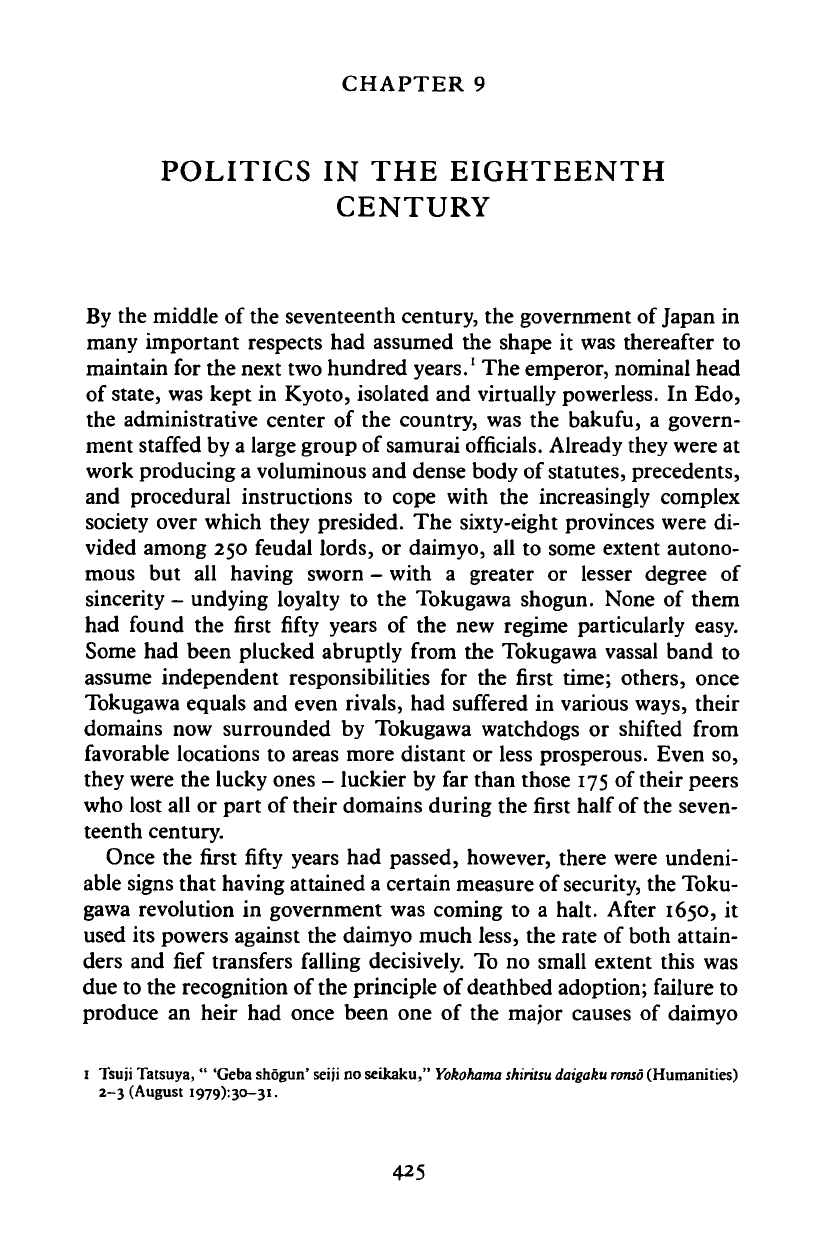
CHAPTER
9
POLITICS IN THE EIGHTEENTH
CENTURY
By the middle of the seventeenth century, the government of Japan in
many important respects had assumed the shape it was thereafter to
maintain for the next two hundred years.
1
The emperor, nominal head
of state, was kept in Kyoto, isolated and virtually powerless. In Edo,
the administrative center of the country, was the bakufu, a govern-
ment staffed by a large group of samurai officials. Already they were at
work producing a voluminous and dense body of
statutes,
precedents,
and procedural instructions to cope with the increasingly complex
society over which they presided. The sixty-eight provinces were di-
vided among 250 feudal lords, or daimyo, all to some extent autono-
mous but all having sworn - with a greater or lesser degree of
sincerity - undying loyalty to the Tokugawa shogun. None of them
had found the first fifty years of the new regime particularly easy.
Some had been plucked abruptly from the Tokugawa vassal band to
assume independent responsibilities for the first time; others, once
Tokugawa equals and even rivals, had suffered in various ways, their
domains now surrounded by Tokugawa watchdogs or shifted from
favorable locations to areas more distant or less prosperous. Even so,
they were the lucky ones - luckier by far than those 175 of their peers
who lost all or part of their domains during the first half of the seven-
teenth century.
Once the first fifty years had passed, however, there were undeni-
able signs that having attained a certain measure of
security,
the Toku-
gawa revolution in government was coming to a halt. After 1650, it
used its powers against the daimyo much less, the rate of both attain-
ders and fief transfers falling decisively. To no small extent this was
due to the recognition of the principle of deathbed adoption; failure to
produce an heir had once been one of the major causes of daimyo
i Tsuji Tatsuya," 'Geba shogun' seiji no seikaku,"
Yokohama shiritsu daigaku ronso
(Humanities)
2-3 (August i979):3°-3i-
425
Cambridge Histories Online © Cambridge University Press, 2008
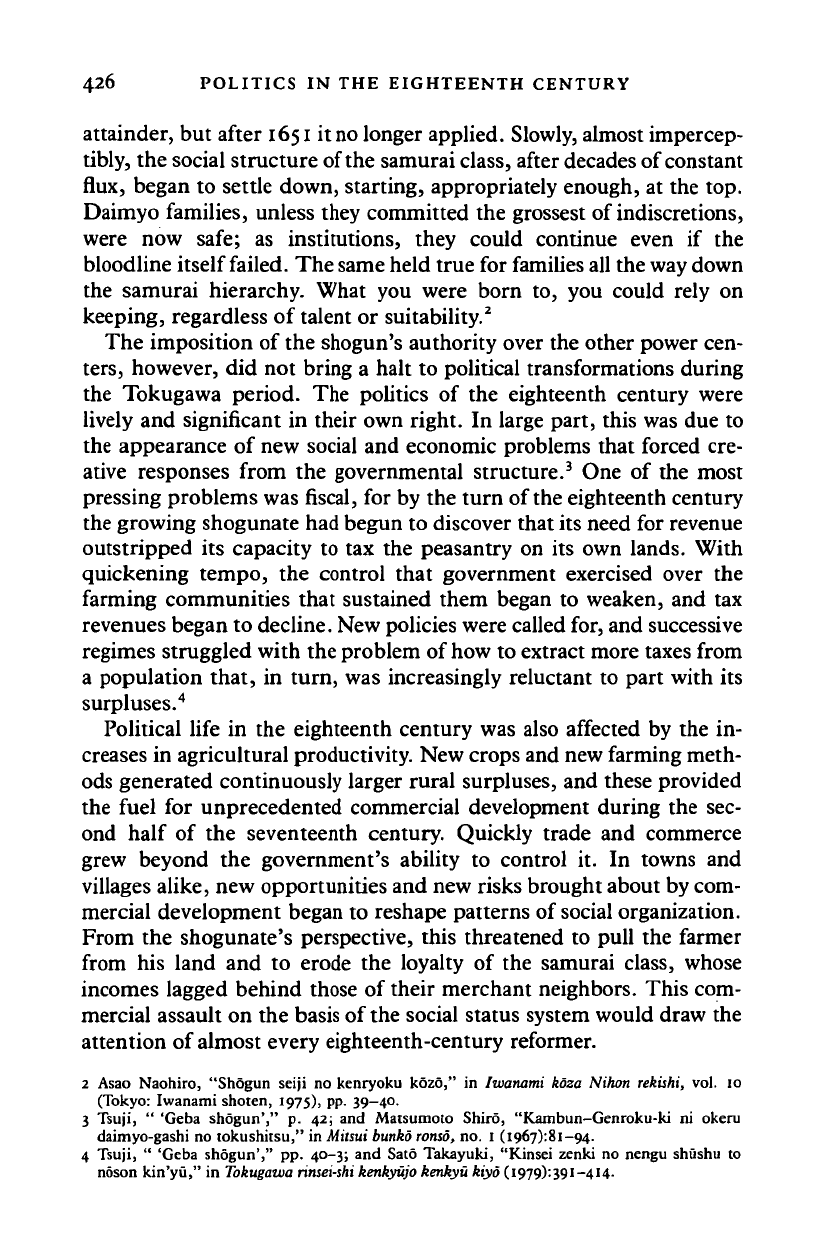
426 POLITICS IN THE EIGHTEENTH CENTURY
attainder, but after
1651
it
no
longer applied. Slowly, almost impercep-
tibly, the social structure of the samurai class, after decades of constant
flux, began to settle down, starting, appropriately enough, at the top.
Daimyo families, unless they committed the grossest of indiscretions,
were now safe; as institutions, they could continue even if the
bloodline itself failed. The same held true for families all the way down
the samurai hierarchy. What you were born to, you could rely on
keeping, regardless of talent or suitability.
2
The imposition of the shogun's authority over the other power cen-
ters,
however, did not bring a halt to political transformations during
the Tokugawa period. The politics of the eighteenth century were
lively and significant in their own right. In large part, this was due to
the appearance of new social and economic problems that forced cre-
ative responses from the governmental structure.
3
One of the most
pressing problems was
fiscal,
for by the turn of
the
eighteenth century
the growing shogunate had begun to discover that its need for revenue
outstripped its capacity to tax the peasantry on its own lands. With
quickening tempo, the control that government exercised over the
farming communities that sustained them began to weaken, and tax
revenues began to decline. New policies were called for, and successive
regimes struggled with the problem of how to extract more taxes from
a population that, in turn, was increasingly reluctant to part with its
surpluses.
4
Political life in the eighteenth century was also affected by the in-
creases in agricultural productivity. New crops and new farming meth-
ods generated continuously larger rural surpluses, and these provided
the fuel for unprecedented commercial development during the sec-
ond half of the seventeenth century. Quickly trade and commerce
grew beyond the government's ability to control it. In towns and
villages alike, new opportunities and new risks brought about by com-
mercial development began to reshape patterns of social organization.
From the shogunate's perspective, this threatened to pull the farmer
from his land and to erode the loyalty of the samurai class, whose
incomes lagged behind those of their merchant neighbors. This com-
mercial assault on the basis of the social status system would draw the
attention of almost every eighteenth-century reformer.
2 Asao Naohiro, "Shogun seiji no kenryoku kozo," in Iwanami koza Nihon
rekishi,
vol. 10
(Tokyo: Iwanami shoten, 1975), pp. 39-40.
3 Tsuji, " 'Geba shogun'," p. 42; and Matsumoto Shiro, "Kambun-Genroku-ki ni okeru
daimyo-gashi no tokushitsu," in
Mitsui bunko
ronso,
no.
1
(i967):8i-94-
4 Tsuji, " 'Geba shogun'," pp. 40-3; and Sato Takayuki, "Kinsei zenki no nengu shushu to
noson kin'yu," in
Tokugawa ritisei-shi kenkyujo kenkyu kiyo
(I979):39I-4I4.
Cambridge Histories Online © Cambridge University Press, 2008
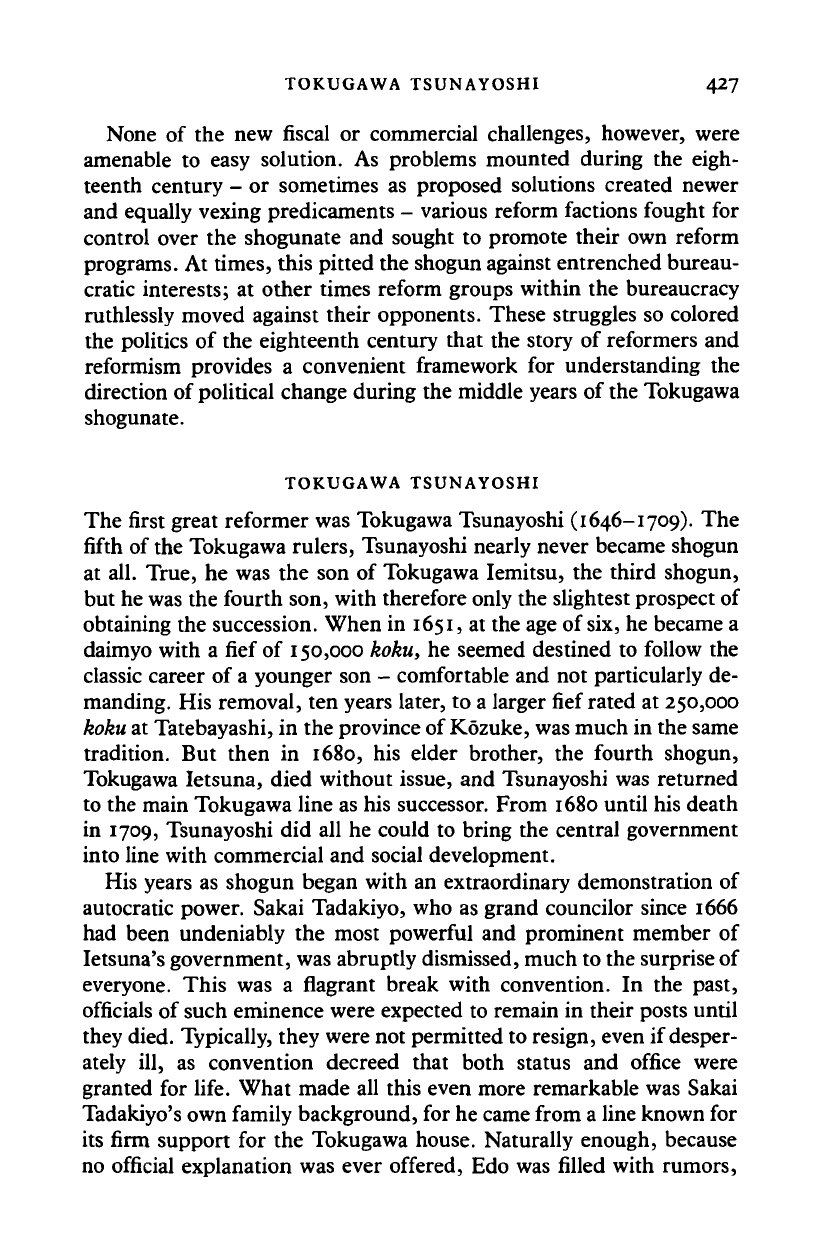
TOKUGAWA TSUNAYOSHI 427
None of the new fiscal or commercial challenges, however, were
amenable to easy solution. As problems mounted during the eigh-
teenth century - or sometimes as proposed solutions created newer
and equally vexing predicaments - various reform factions fought for
control over the shogunate and sought to promote their own reform
programs. At times, this pitted the shogun against entrenched bureau-
cratic interests; at other times reform groups within the bureaucracy
ruthlessly moved against their opponents. These struggles so colored
the politics of the eighteenth century that the story of reformers and
reformism provides a convenient framework for understanding the
direction of political change during the middle years of the Tokugawa
shogunate.
TOKUGAWA TSUNAYOSHI
The first great reformer was Tokugawa Tsunayoshi (1646-1709). The
fifth of the Tokugawa rulers, Tsunayoshi nearly never became shogun
at all. True, he was the son of Tokugawa Iemitsu, the third shogun,
but he was the fourth son, with therefore only the slightest prospect of
obtaining the succession. When in
1651,
at the age of
six,
he became a
daimyo with a fief of 150,000 koku, he seemed destined to follow the
classic career of a younger son - comfortable and not particularly de-
manding. His removal, ten years later, to a larger fief rated at 250,000
koku
at Tatebayashi, in the province of
Kozuke,
was much in the same
tradition. But then in 1680, his elder brother, the fourth shogun,
Tokugawa Ietsuna, died without issue, and Tsunayoshi was returned
to the main Tokugawa line as his successor. From 1680 until his death
in 1709, Tsunayoshi did all he could to bring the central government
into line with commercial and social development.
His years as shogun began with an extraordinary demonstration of
autocratic power. Sakai Tadakiyo, who as grand councilor since 1666
had been undeniably the most powerful and prominent member of
Ietsuna's government, was abruptly dismissed, much to the surprise of
everyone. This was a flagrant break with convention. In the past,
officials of such eminence were expected to remain in their posts until
they died. Typically, they were not permitted to resign, even if desper-
ately ill, as convention decreed that both status and office were
granted for life. What made all this even more remarkable was Sakai
Tadakiyo's own family background, for he came from a line known for
its firm support for the Tokugawa house. Naturally enough, because
no official explanation was ever offered, Edo was filled with rumors,
Cambridge Histories Online © Cambridge University Press, 2008
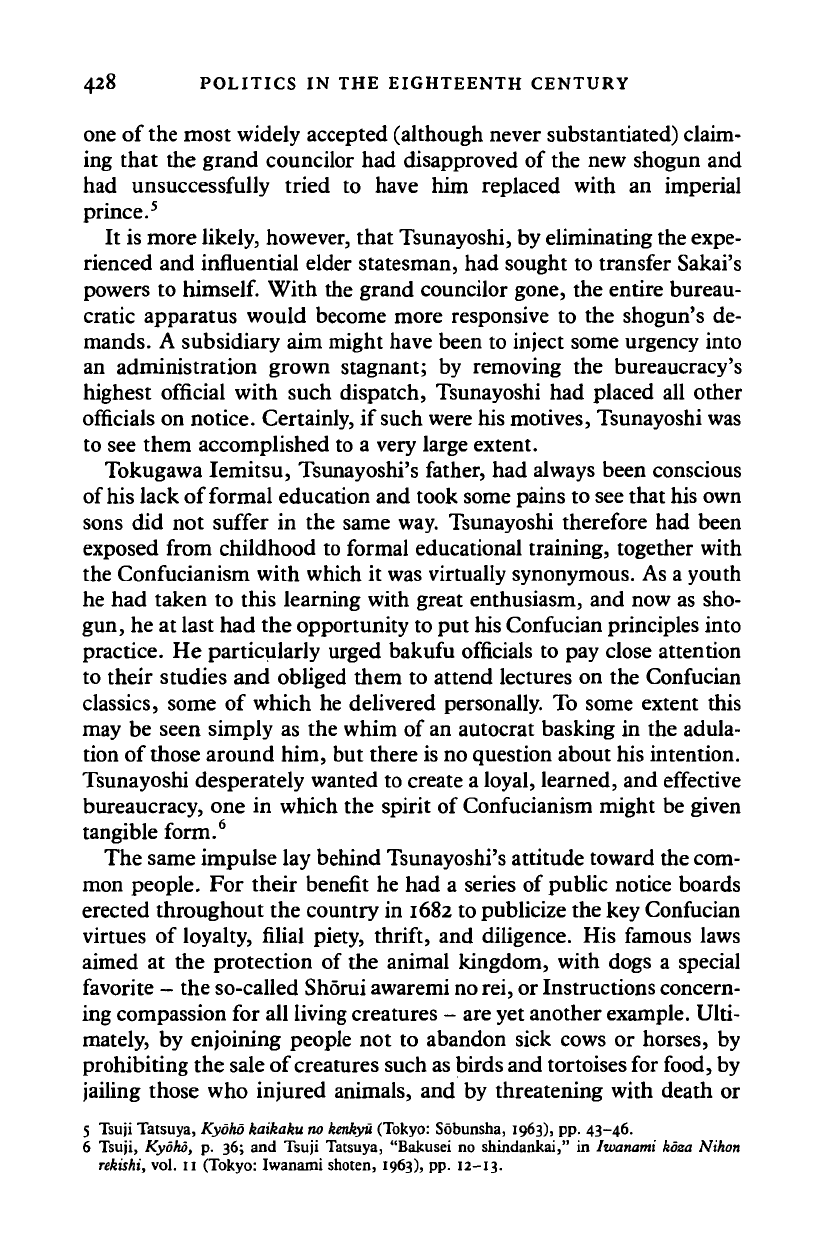
428 POLITICS IN THE EIGHTEENTH CENTURY
one of the most widely accepted (although never substantiated) claim-
ing that the grand councilor had disapproved of the new shogun and
had unsuccessfully tried to have him replaced with an imperial
prince.
5
It is more likely, however, that Tsunayoshi, by eliminating the expe-
rienced and influential elder statesman, had sought to transfer Sakai's
powers to
himself.
With the grand councilor gone, the entire bureau-
cratic apparatus would become more responsive to the shogun's de-
mands. A subsidiary aim might have been to inject some urgency into
an administration grown stagnant; by removing the bureaucracy's
highest official with such dispatch, Tsunayoshi had placed all other
officials on notice. Certainly, if such were his motives, Tsunayoshi was
to see them accomplished to a very large extent.
Tokugawa Iemitsu, Tsunayoshi's father, had always been conscious
of his lack of formal education and took some pains to see that his own
sons did not suffer in the same way. Tsunayoshi therefore had been
exposed from childhood to formal educational training, together with
the Confucianism with which it was virtually synonymous. As a youth
he had taken to this learning with great enthusiasm, and now as sho-
gun, he at last had the opportunity to put his Confucian principles into
practice. He particularly urged bakufu officials to pay close attention
to their studies and obliged them to attend lectures on the Confucian
classics, some of which he delivered personally. To some extent this
may be seen simply as the whim of an autocrat basking in the adula-
tion of those around him, but there is no question about his intention.
Tsunayoshi desperately wanted to create a loyal, learned, and effective
bureaucracy, one in which the spirit of Confucianism might be given
tangible form.
6
The same impulse lay behind Tsunayoshi's attitude toward the com-
mon people. For their benefit he had a series of public notice boards
erected throughout the country in 1682 to publicize the key Confucian
virtues of loyalty, filial piety, thrift, and diligence. His famous laws
aimed at the protection of the animal kingdom, with dogs a special
favorite - the so-called Shorui awaremi no
rei,
or Instructions concern-
ing compassion for all living creatures - are yet another example. Ulti-
mately, by enjoining people not to abandon sick cows or horses, by
prohibiting the sale of creatures such as birds and tortoises for food, by
jailing those who injured animals, and by threatening with death or
5 Tsuji Tatsuya, Kyoho kaikaku no kenkyii (Tokyo: Sobunsha, 1963), pp. 43-46.
6 Tsuji, Kyoho, p. 36; and Tsuji Tatsuya, "Bakusei no shindankai," in Iwanami kbza Nihon
rekishi, vol. 11 (Tokyo: Iwanami shoten, 1963), pp.
12-13.
Cambridge Histories Online © Cambridge University Press, 2008
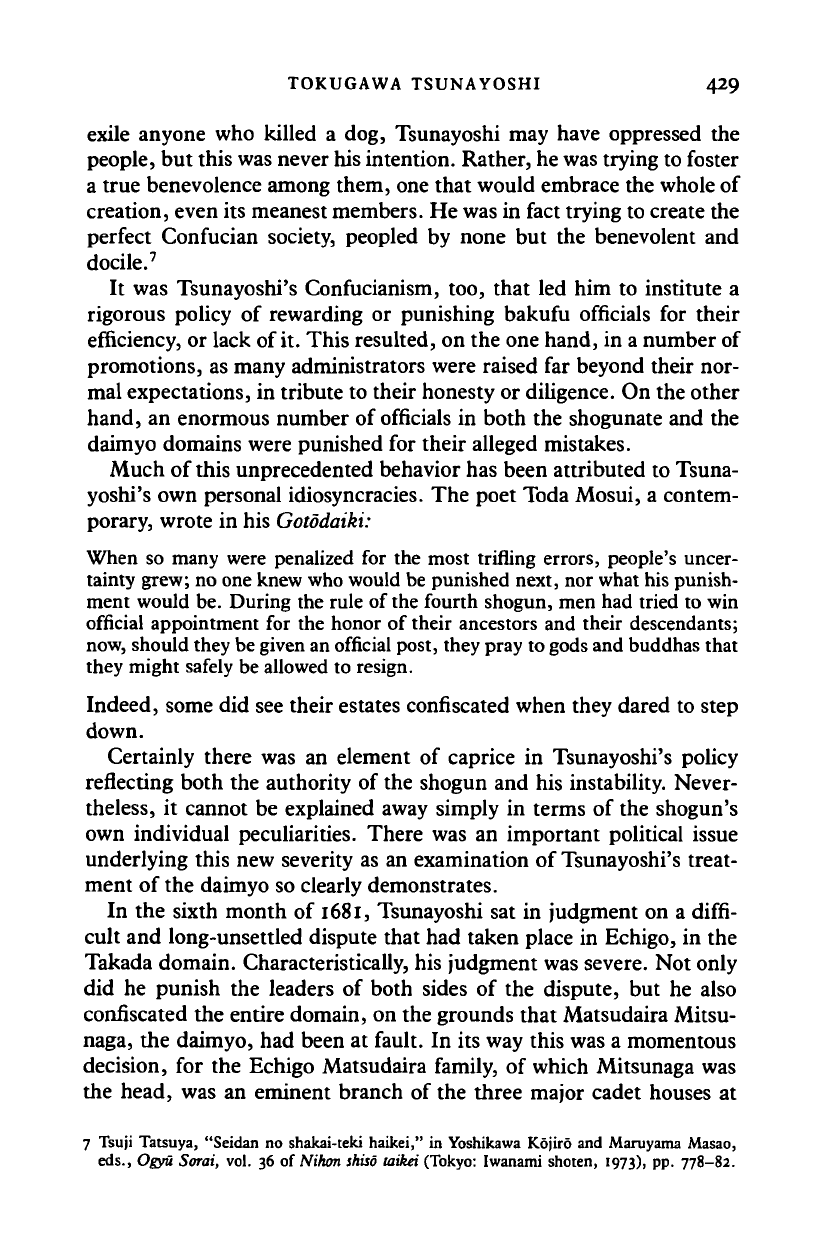
TOKUGAWA TSUNAYOSHI 429
exile anyone who killed a dog, Tsunayoshi may have oppressed the
people, but this was never his intention. Rather, he was trying to foster
a true benevolence among them, one that would embrace the whole of
creation, even its meanest members. He was in fact trying to create the
perfect Confucian society, peopled by none but the benevolent and
docile.
7
It was Tsunayoshi's Confucianism, too, that led him to institute a
rigorous policy of rewarding or punishing bakufu officials for their
efficiency, or lack of
it.
This resulted, on the one hand, in a number of
promotions, as many administrators were raised far beyond their nor-
mal expectations, in tribute to their honesty or diligence. On the other
hand, an enormous number of officials in both the shogunate and the
daimyo domains were punished for their alleged mistakes.
Much of this unprecedented behavior has been attributed to Tsuna-
yoshi's own personal idiosyncracies. The poet Toda Mosui, a contem-
porary, wrote in his Gotodaiki:
When so many were penalized for the most trifling errors, people's uncer-
tainty grew; no one knew who would be punished next, nor what his punish-
ment would be. During the rule of the fourth shogun, men had tried to win
official appointment for the honor of their ancestors and their descendants;
now, should they be given an official post, they pray to gods and buddhas that
they might safely be allowed to resign.
Indeed, some did see their estates confiscated when they dared to step
down.
Certainly there was an element of caprice in Tsunayoshi's policy
reflecting both the authority of the shogun and his instability. Never-
theless, it cannot be explained away simply in terms of the shogun's
own individual peculiarities. There was an important political issue
underlying this new severity as an examination of Tsunayoshi's treat-
ment of the daimyo so clearly demonstrates.
In the sixth month of 1681, Tsunayoshi sat in judgment on a diffi-
cult and long-unsettled dispute that had taken place in Echigo, in the
Takada domain. Characteristically, his judgment was severe. Not only
did he punish the leaders of both sides of the dispute, but he also
confiscated the entire domain, on the grounds that Matsudaira Mitsu-
naga, the daimyo, had been at fault. In its way this was a momentous
decision, for the Echigo Matsudaira family, of which Mitsunaga was
the head, was an eminent branch of the three major cadet houses at
7 Tsuji Tatsuya, "Seidan no shakai-teki haikei," in Yoshikawa Kojiro and Maruyama Masao,
eds.,
Ogyu Sorai, vol. 36 of Nihon shiso taikei (Tokyo: Iwanami shoten, 1973), pp. 778-82.
Cambridge Histories Online © Cambridge University Press, 2008
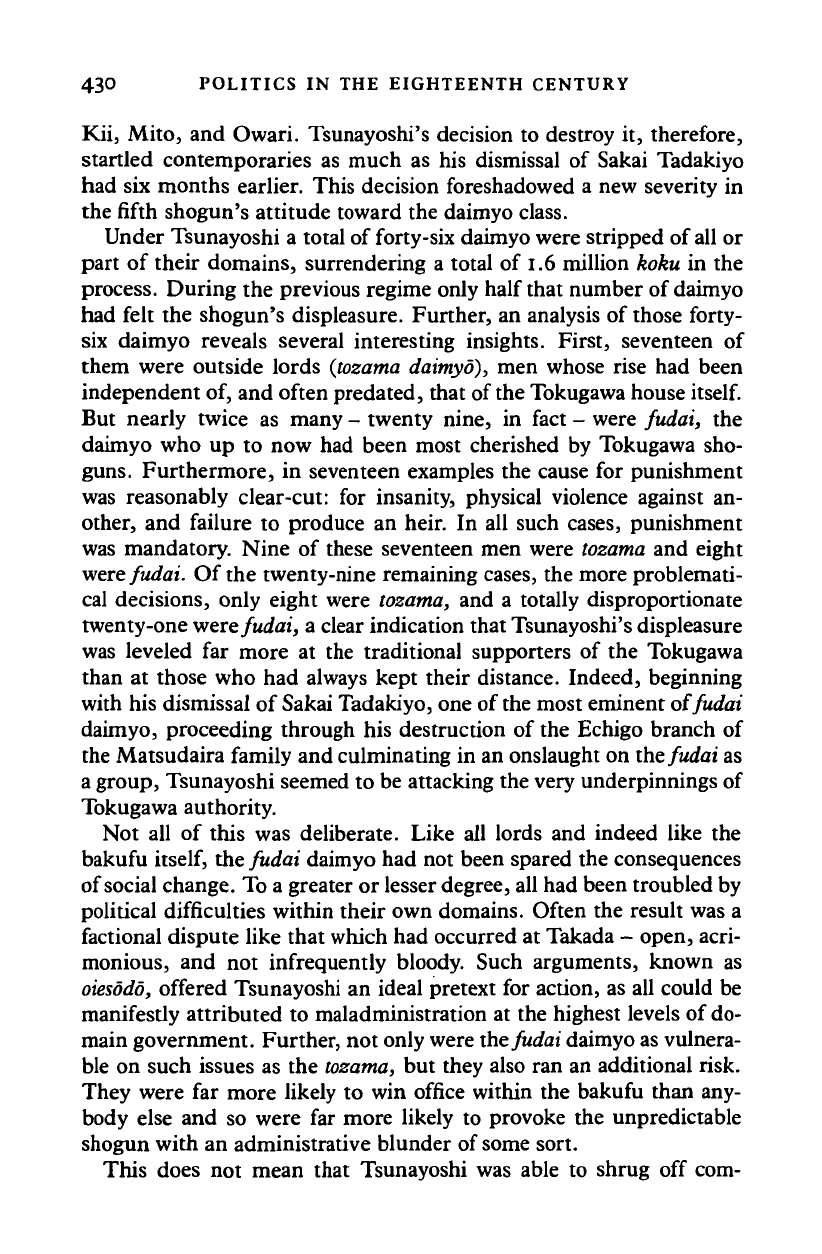
430 POLITICS
IN THE
EIGHTEENTH CENTURY
Kii,
Mito,
and
Owari. Tsunayoshi's decision
to
destroy
it,
therefore,
startled contemporaries
as
much
as his
dismissal
of
Sakai Tadakiyo
had
six
months earlier. This decision foreshadowed
a new
severity
in
the fifth shogun's attitude toward
the
daimyo class.
Under Tsunayoshi
a
total
of
forty-six daimyo were stripped
of
all
or
part
of
their domains, surrendering
a
total
of 1.6
million koku
in the
process. During
the
previous regime only half that number
of
daimyo
had felt
the
shogun's displeasure. Further,
an
analysis
of
those forty-
six daimyo reveals several interesting insights. First, seventeen
of
them were outside lords
(tozama
daimyo),
men
whose rise
had
been
independent
of, and
often predated, that
of
the Tokugawa house
itself.
But nearly twice
as
many
-
twenty nine,
in
fact
-
were fudai,
the
daimyo
who up to now had
been most cherished
by
Tokugawa
sho-
guns.
Furthermore,
in
seventeen examples
the
cause
for
punishment
was reasonably clear-cut:
for
insanity, physical violence against
an-
other,
and
failure
to
produce
an
heir.
In all
such cases, punishment
was mandatory. Nine
of
these seventeen
men
were
tozama
and
eight
were fudai.
Of
the twenty-nine remaining cases,
the
more problemati-
cal decisions, only eight were tozama,
and a
totally disproportionate
twenty-one were fudai,
a
clear indication that Tsunayoshi's displeasure
was leveled
far
more
at the
traditional supporters
of the
Tokugawa
than
at
those
who had
always kept their distance. Indeed, beginning
with
his
dismissal
of
Sakai Tadakiyo,
one of
the
most eminent of fudai
daimyo, proceeding through
his
destruction
of the
Echigo branch
of
the Matsudaira family
and
culminating
in an
onslaught
on
the fudai
as
a group, Tsunayoshi seemed
to be
attacking
the
very underpinnings of
Tokugawa authority.
Not
all of
this
was
deliberate. Like
all
lords
and
indeed like
the
bakufu
itself,
the fudai daimyo
had not
been spared
the
consequences
of social change. To
a
greater
or
lesser degree,
all had
been troubled
by
political difficulties within their
own
domains. Often
the
result
was a
factional dispute like that which
had
occurred
at
Takada
-
open, acri-
monious,
and not
infrequently bloody. Such arguments, known
as
oiesodo,
offered Tsunayoshi
an
ideal pretext
for
action,
as all
could
be
manifestly attributed
to
maladministration
at the
highest levels
of
do-
main government. Further,
not
only were the fudai daimyo as vulnera-
ble
on
such issues
as the
tozama,
but
they also
ran an
additional risk.
They were
far
more likely
to win
office within
the
bakufu than
any-
body else
and so
were
far
more likely
to
provoke
the
unpredictable
shogun with
an
administrative blunder
of
some sort.
This does
not
mean that Tsunayoshi
was
able
to
shrug
off com-
Cambridge Histories Online © Cambridge University Press, 2008
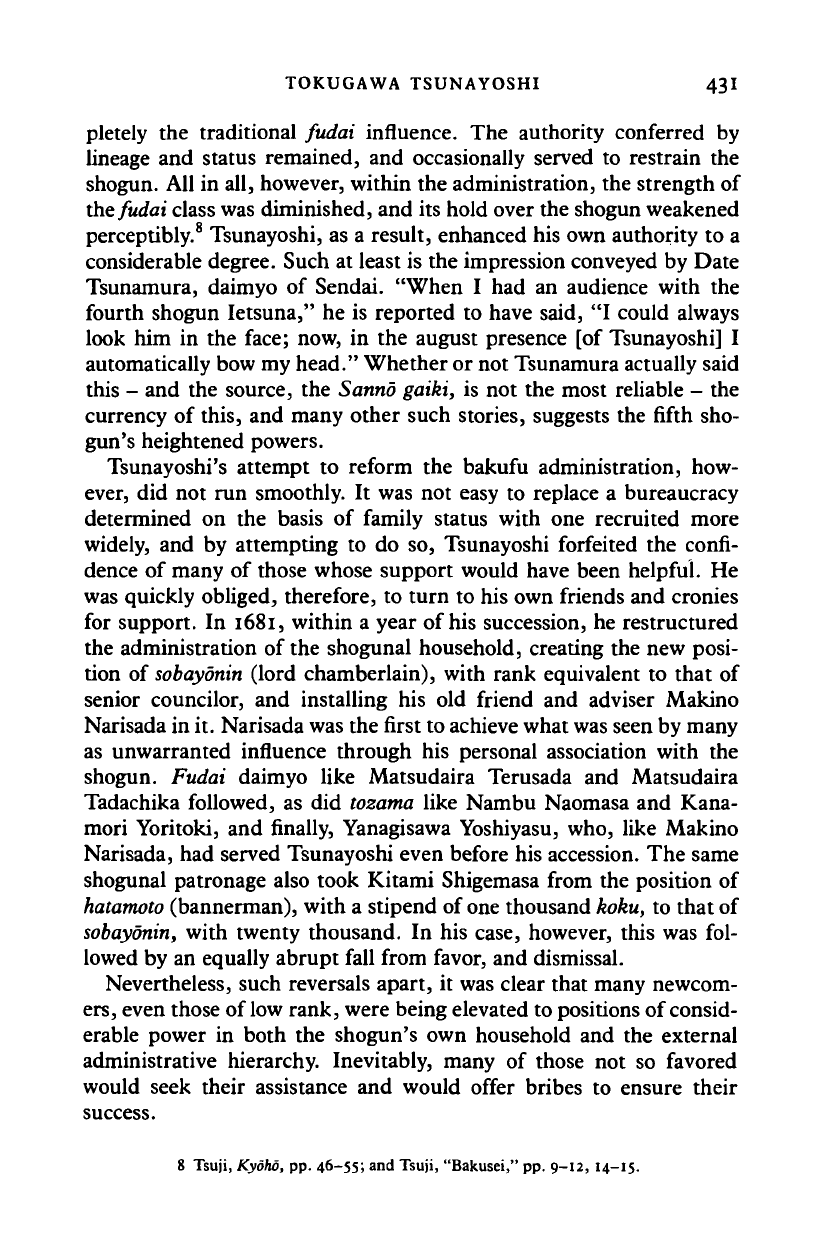
TOKUGAWA TSUNAYOSHI 431
pletely the traditional fudai influence. The authority conferred by
lineage and status remained, and occasionally served to restrain the
shogun. All in all, however, within the administration, the strength of
the fudai class was diminished, and its hold over the shogun weakened
perceptibly.
8
Tsunayoshi, as a result, enhanced his own authority to a
considerable degree. Such at least is the impression conveyed by Date
Tsunamura, daimyo of Sendai. "When I had an audience with the
fourth shogun Ietsuna," he is reported to have said, "I could always
look him in the face; now, in the august presence [of Tsunayoshi] I
automatically bow my head." Whether or not Tsunamura actually said
this - and the source, the Sanno gaiki, is not the most reliable - the
currency of this, and many other such stories, suggests the fifth sho-
gun's heightened powers.
Tsunayoshi's attempt to reform the bakufu administration, how-
ever, did not run smoothly. It was not easy to replace a bureaucracy
determined on the basis of family status with one recruited more
widely, and by attempting to do so, Tsunayoshi forfeited the confi-
dence of many of those whose support would have been helpful. He
was quickly obliged, therefore, to turn to his own friends and cronies
for support. In 1681, within a year of his succession, he restructured
the administration of the shogunal household, creating the new posi-
tion of
sobayonin
(lord chamberlain), with rank equivalent to that of
senior councilor, and installing his old friend and adviser Makino
Narisada in it. Narisada was the first to achieve what was seen by many
as unwarranted influence through his personal association with the
shogun. Fudai daimyo like Matsudaira Terusada and Matsudaira
Tadachika followed, as did tozama like Nambu Naomasa and Kana-
mori Yoritoki, and finally, Yanagisawa Yoshiyasu, who, like Makino
Narisada, had served Tsunayoshi even before his accession. The same
shogunal patronage also took Kitami Shigemasa from the position of
hatamoto
(bannerman), with a stipend of
one
thousand
koku,
to that of
sobayonin,
with twenty thousand. In his case, however, this was fol-
lowed by an equally abrupt fall from favor, and dismissal.
Nevertheless, such reversals apart, it was clear that many newcom-
ers,
even those of
low
rank, were being elevated to positions of consid-
erable power in both the shogun's own household and the external
administrative hierarchy. Inevitably, many of those not so favored
would seek their assistance and would offer bribes to ensure their
success.
8 Tsuji, Kyoho, pp. 46-55; and Tsuji, "Bakusei," pp. 9-12, 14-15.
Cambridge Histories Online © Cambridge University Press, 2008
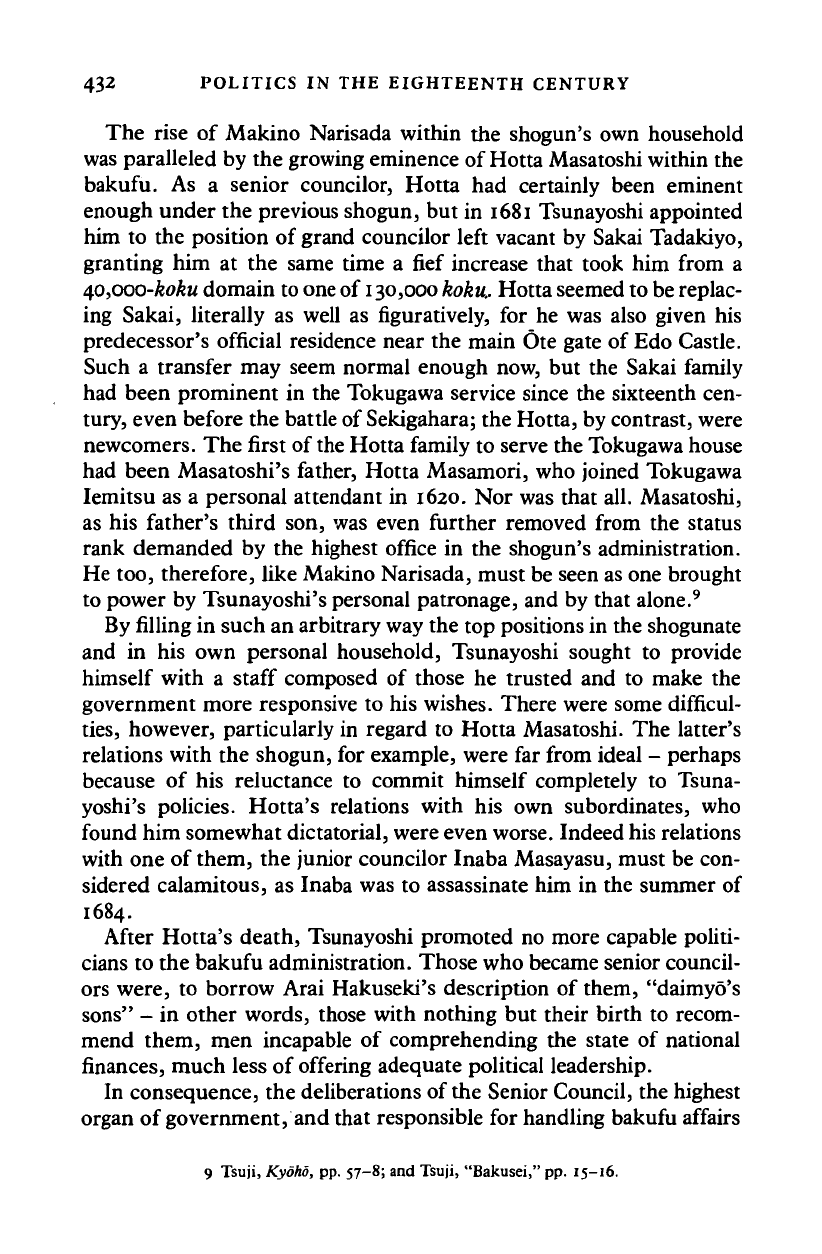
432 POLITICS IN THE EIGHTEENTH CENTURY
The rise
of
Makino Narisada within
the
shogun's
own
household
was paralleled by the growing eminence of Hotta Masatoshi within the
bakufu.
As a
senior councilor, Hotta
had
certainly been eminent
enough under the previous shogun, but
in
1681 Tsunayoshi appointed
him
to the
position
of
grand councilor left vacant
by
Sakai Tadakiyo,
granting
him at the
same time
a
fief increase that took
him
from
a
40,000-koku
domain to one
of
130,000
koku..
Hotta seemed to be replac-
ing Sakai, literally
as
well
as
figuratively,
for he was
also given
his
predecessor's official residence near
the
main Ote gate
of
Edo Castle.
Such
a
transfer
may
seem normal enough now,
but the
Sakai family
had been prominent
in
the Tokugawa service since the sixteenth cen-
tury, even before the battle
of
Sekigahara; the Hotta, by contrast, were
newcomers.
The
first of
the
Hotta family
to
serve the Tokugawa house
had been Masatoshi's father, Hotta Masamori, who joined Tokugawa
Iemitsu
as a
personal attendant
in
1620.
Nor
was that all. Masatoshi,
as
his
father's third
son,
was even further removed from
the
status
rank demanded
by the
highest office
in the
shogun's administration.
He too, therefore, like Makino Narisada, must be seen as one brought
to power
by
Tsunayoshi's personal patronage, and by that alone.
9
By
filling
in
such an arbitrary way the top positions in the shogunate
and
in his own
personal household, Tsunayoshi sought
to
provide
himself with
a
staff composed
of
those
he
trusted
and to
make
the
government more responsive
to
his wishes. There were some difficul-
ties,
however, particularly
in
regard
to
Hotta Masatoshi.
The
latter's
relations with
the
shogun,
for
example, were
far
from ideal
-
perhaps
because
of his
reluctance
to
commit himself completely
to
Tsuna-
yoshi's policies. Hotta's relations with
his own
subordinates,
who
found him somewhat dictatorial, were even worse. Indeed his relations
with one
of
them,
the
junior councilor Inaba Masayasu, must be con-
sidered calamitous,
as
Inaba was
to
assassinate him
in
the summer
of
1684.
After Hotta's death, Tsunayoshi promoted
no
more capable politi-
cians
to
the bakufu administration. Those who became senior council-
ors were,
to
borrow Arai Hakuseki's description
of
them, "daimyo's
sons"
- in
other words, those with nothing
but
their birth
to
recom-
mend them,
men
incapable
of
comprehending
the
state
of
national
finances, much less
of
offering adequate political leadership.
In consequence, the deliberations
of
the Senior Council, the highest
organ
of
government, and that responsible
for
handling bakufu affairs
9 Tsuji,
Kyoho,
pp. 57-8; and Tsuji, "Bakusei," pp. 15-16.
Cambridge Histories Online © Cambridge University Press, 2008
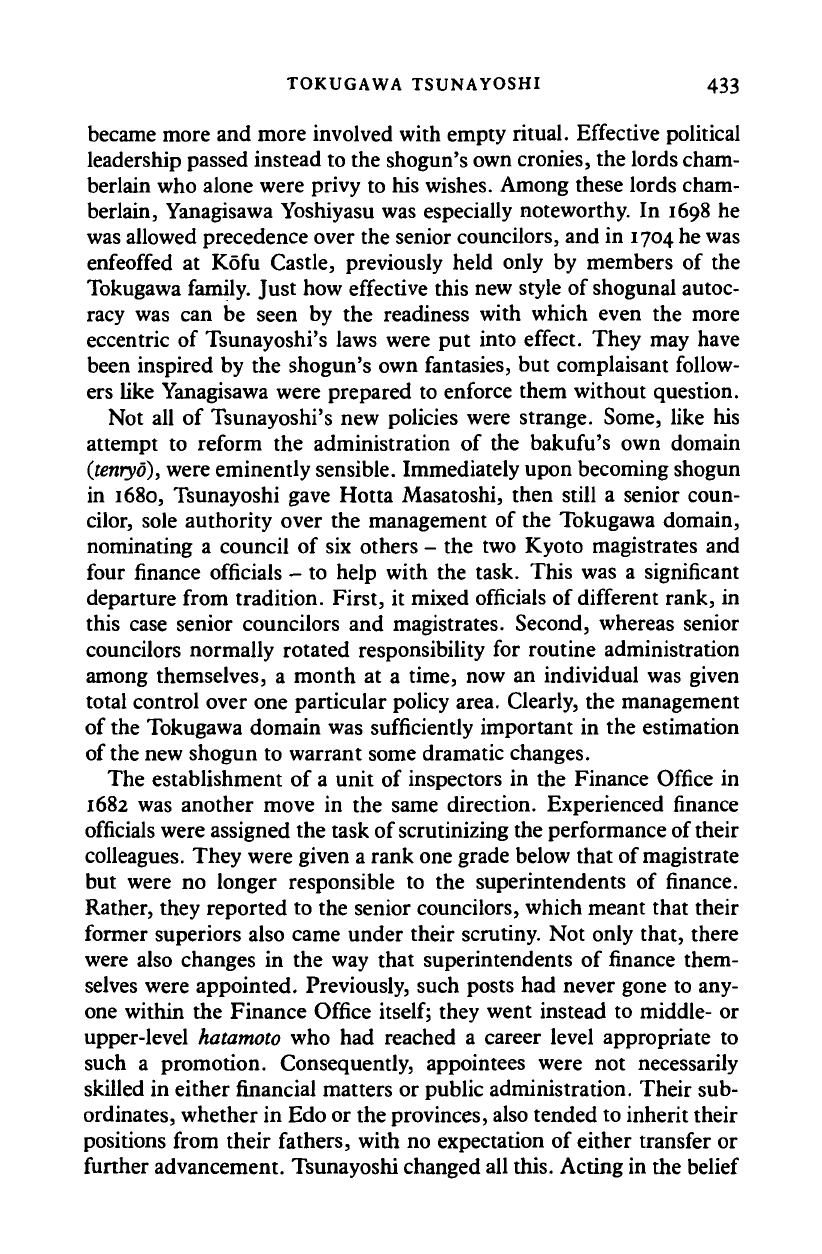
TOKUGAWA TSUNAYOSHI 433
became more and more involved with empty ritual. Effective political
leadership passed instead to the shogun's own cronies, the lords cham-
berlain who alone were privy to his wishes. Among these lords cham-
berlain, Yanagisawa Yoshiyasu was especially noteworthy. In 1698 he
was allowed precedence over the senior councilors, and in 1704 he was
enfeoffed at Kofu Castle, previously held only by members of the
Tokugawa family. Just how effective this new style of shogunal autoc-
racy was can be seen by the readiness with which even the more
eccentric of Tsunayoshi's laws were put into effect. They may have
been inspired by the shogun's own fantasies, but complaisant follow-
ers like Yanagisawa were prepared to enforce them without question.
Not all of Tsunayoshi's new policies were strange. Some, like his
attempt to reform the administration of the bakufu's own domain
(tenryo),
were eminently sensible. Immediately upon becoming shogun
in 1680, Tsunayoshi gave Hotta Masatoshi, then still a senior coun-
cilor, sole authority over the management of the Tokugawa domain,
nominating a council of six others - the two Kyoto magistrates and
four finance officials - to help with the task. This was a significant
departure from tradition. First, it mixed officials of different rank, in
this case senior councilors and magistrates. Second, whereas senior
councilors normally rotated responsibility for routine administration
among themselves, a month at a time, now an individual was given
total control over one particular policy area. Clearly, the management
of the Tokugawa domain was sufficiently important in the estimation
of the new shogun to warrant some dramatic changes.
The establishment of a unit of inspectors in the Finance Office in
1682 was another move in the same direction. Experienced finance
officials were assigned the task of scrutinizing the performance of their
colleagues. They were given a rank one grade below that of magistrate
but were no longer responsible to the superintendents of finance.
Rather, they reported to the senior councilors, which meant that their
former superiors also came under their scrutiny. Not only that, there
were also changes in the way that superintendents of finance them-
selves were appointed. Previously, such posts had never gone to any-
one within the Finance Office
itself;
they went instead to middle- or
upper-level
hatamoto
who had reached a career level appropriate to
such a promotion. Consequently, appointees were not necessarily
skilled in either financial matters or public administration. Their sub-
ordinates, whether in Edo or the provinces, also tended to inherit their
positions from their fathers, with no expectation of either transfer or
further advancement. Tsunayoshi changed all this. Acting in the belief
Cambridge Histories Online © Cambridge University Press, 2008
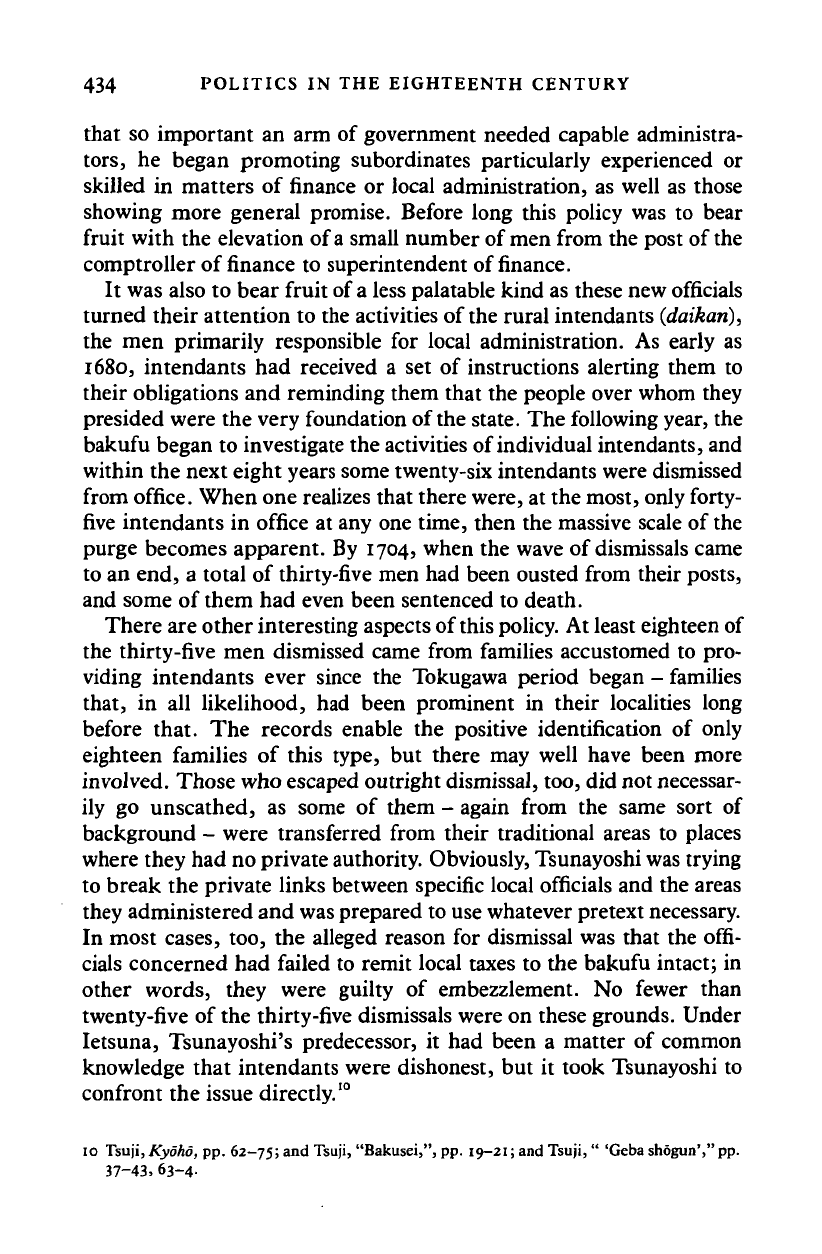
434 POLITICS IN THE EIGHTEENTH CENTURY
that
so
important
an
arm
of
government needed capable administra-
tors,
he
began promoting subordinates particularly experienced
or
skilled
in
matters
of
finance
or
local administration,
as
well
as
those
showing more general promise. Before long this policy
was to
bear
fruit with the elevation of a small number
of
men from the post
of
the
comptroller
of
finance
to
superintendent
of
finance.
It was also
to
bear fruit of
a
less palatable kind as these new officials
turned their attention
to
the activities
of
the rural intendants (daikan),
the
men
primarily responsible
for
local administration.
As
early
as
1680,
intendants
had
received
a set of
instructions alerting them
to
their obligations
and
reminding them that the people over whom they
presided were the very foundation of
the
state. The following year, the
bakufu began
to
investigate the activities of individual intendants, and
within the next eight years some twenty-six intendants were dismissed
from office. When one realizes that there were,
at
the most, only forty-
five intendants
in
office
at
any one time, then the massive scale
of
the
purge becomes apparent.
By
1704, when
the
wave
of
dismissals came
to an end,
a
total
of
thirty-five men had been ousted from their posts,
and some
of
them had even been sentenced
to
death.
There are other interesting aspects of this policy. At least eighteen of
the thirty-five
men
dismissed came from families accustomed
to
pro-
viding intendants ever since
the
Tokugawa period began
-
families
that,
in all
likelihood,
had
been prominent
in
their localities long
before that.
The
records enable
the
positive identification
of
only
eighteen families
of
this type,
but
there
may
well have been more
involved. Those who escaped outright dismissal, too, did not necessar-
ily
go
unscathed,
as
some
of
them
-
again from
the
same sort
of
background
-
were transferred from their traditional areas
to
places
where they had no private authority. Obviously, Tsunayoshi was trying
to break the private links between specific local officials
and
the areas
they administered and was prepared to use whatever pretext necessary.
In most cases,
too, the
alleged reason
for
dismissal was that
the
offi-
cials concerned had failed
to
remit local taxes
to the
bakufu intact;
in
other words, they were guilty
of
embezzlement.
No
fewer than
twenty-five
of
the thirty-five dismissals were on these grounds. Under
Ietsuna, Tsunayoshi's predecessor,
it had
been
a
matter
of
common
knowledge that intendants were dishonest,
but it
took Tsunayoshi
to
confront the issue directly.
10
10 Tsuji,
Kyoho,
pp. 62-75;
an
d
Tsuji, "Bakusei,", pp.
19-21;
and Tsuji," 'Geba shogun'," pp.
37-43.
63-4.
Cambridge Histories Online © Cambridge University Press, 2008
